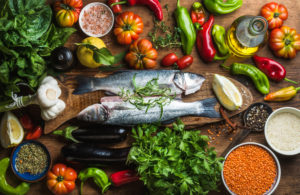 Concern About Being Underweight
Concern About Being Underweight
Most of the headlines about health seem to be concerning people who are overweight, but what if you are worried about the opposite? Are you worried you are underweight? Or are you a family member or friend and worried your loved one is?
Here’s a few pointers on what to do if you are concerned.
Firstly, why is being underweight a concern?
The type of food you eat and the amount of food is really important when it comes to keeping you well. You body needs good nutrition to be able to heal and repair itself and keep itself healthy. When you don’t get enough food in, your body may look for other sources of fuel. This includes breaking down your own muscle to provide itself with what it needs.
 Having a balanced diet, one that includes lots of fruit, vegetables, wholegrains and healthy proteins (like chickpeas, lentils, fish and chicken), is important for making sure your body can fight bugs and viruses. In fact, a study from researchers from King’s and Harvard Medical School examined diets from nearly 600,000 people who contributed to the Covid app 'Zoe'. People with good quality diets were less likely to develop Covid-19 than those with poor diets and much less likely to fall severely ill.
Having a balanced diet, one that includes lots of fruit, vegetables, wholegrains and healthy proteins (like chickpeas, lentils, fish and chicken), is important for making sure your body can fight bugs and viruses. In fact, a study from researchers from King’s and Harvard Medical School examined diets from nearly 600,000 people who contributed to the Covid app 'Zoe'. People with good quality diets were less likely to develop Covid-19 than those with poor diets and much less likely to fall severely ill.
Being underweight and having a poor diet may mean that your bones are weaker and this can cause fractures. You may also notice that you feel tired or low in energy.
Your doctor or nurse may have commented that you may not be a healthy weight or even a family member. Or it may have been suggested that your weight is low especially if you’ve been investigated for a new fracture or vitamin deficiency.
Losing weight
If you feel you have lost weight without an explanation, or your clothes suddenly feel looser, it’s always important to see your GP. There are different reasons why you may have lost weight. For example, when your thyroid gland (a small butterfly shaped gland, that sits in your neck) is too active or it can be caused by certain medications. However there are also more serious causes, like cancer, that need to be ruled out. Therefore it’s really important to see your GP straight away if you have unexplained weight loss.
If you have lost weight without a cause, your GP may refer you to hospital for further tests and investigations.
Once other causes have been ruled out, your GP may refer you to a dietician who can look at your diet to see how it can be improved. Alternatively you may be given high calorie drinks and milkshakes to help you put on weight.
Underweight and a heavy drinker?
People who are drinking more than the government guidelines, which is around 14 units per week (the equivalent of 6 pints of beer or 6 medium glasses of wine) may find their diet suffers.
Drinking too much alcohol may mean that you do the following:
- make unhealthy food choices,
- don’t get enough calories in,
- eat fewer essential vitamins and minerals,
- don’t absorb the nutrients you do eat.
If you regularly drink too much alcohol you can have dangerously low levels of the following nutrients and vitamins:
- folic acid
- vitamin B12
- vitamin A
- calcium
- thiamine
Drinking alcohol can also cause your blood sugar to drop to dangerously low levels. This is more of an issue for those of you with diabetes.
Eating well helps combat alcohol related health problems
Even if you’re struggling to cut back on or stop your alcohol use, it’s important to try and eat well. It’s also important to add that you should never stop drinking suddenly. This can cause your body to go into a dangerous state of withdrawal. Please see the links in the Getting Advice section of this page if you’re worried about your level of drinking, or that of a family member.
We know that even if you find it hard to cut down on alcohol, eating well can reduce the risk of alcohol related health problems.
Eating a meal can slow the absorption of alcohol into your blood stream.
If you’re finding it hard to think about meals, you could use your health grant to buy healthy, prepared meals such as from the following suppliers:
Visit Wiltshire Farm Foods website
Another alternative if that seems too much would be topping up with a meal replacement drink like one from Huel. These have all the protein, fats and vitamins that your body needs from a meal. Whilst they are no replacement for 'real food', they are quick and easy to make and can help boost your nutrition if your eating patterns are erratic. It is better to have a milkshake or drink that nothing at all.
Terminal Illness
If you have a terminal or life limiting illness, then your weight may be well be affected. It would be important to chat to your GP or palliative care nurse for advice regarding this.
Getting further advice
Advice on diet
You can ask your GP to refer you to a dietician on the NHS. Or you can use your Health Grant and see a freelance dietician.
Find a freelance dietician in your area
Advice on alcohol use
Drink Aware has some great resources if you are worried about your own drinking or someone else’s, including an online test to tell if you if you are drinking too much.
Take the drink aware self assessment test
See the drink aware alcohol support services
Al Anon is another great website if you have been affected by someone drinking to excess in your family.
If you are concerned about your alcohol use, or have difficulties in making changes to your alcohol use, it may be helpful to talk to one of the medical advisers at the Trust, your own GP and contact one of the alcohol support groups mentioned above.
Contact Us
If you would like to talk to the Trust in confidence on any of the issues raised here, please contact us on 01480 474074.
